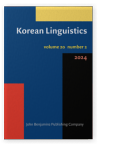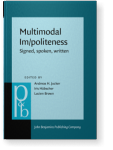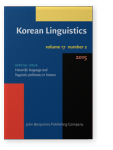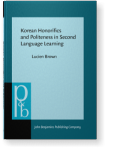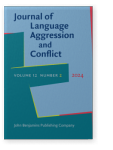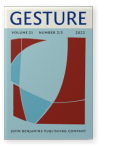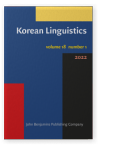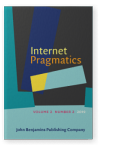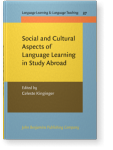Lucien Brown
List of John Benjamins publications for which Lucien Brown plays a role.
Journal
Titles
Multimodal Im/politeness: Signed, spoken, written
Edited by Andreas H. Jucker, Iris Hübscher and Lucien Brown
[Pragmatics & Beyond New Series, 333] 2023. vii, 360 pp.
Subjects Communication Studies | Discourse studies | Gesture Studies | Pragmatics | Theoretical linguistics
Honorific language and linguistic politeness in Korean
Edited by John Whitman and Lucien Brown
Special issue of Korean Linguistics 17:2 (2015) v, 140 pp.
Subjects Linguistics of isolated languages | Theoretical linguistics
Korean Honorifics and Politeness in Second Language Learning
Lucien Brown
[Pragmatics & Beyond New Series, 206] 2011. xiv, 311 pp.
Subjects Language acquisition | Linguistics of isolated languages | Pragmatics
2024 “The denigration of Korean men’s genitals”: Precision grip gestures and the multimodal construction of “taking offence” in media discourse surrounding anti-feminism in South Korea Journal of Language Aggression and Conflict 12:2, pp. 234–262 | Article
This paper presents a critical discourse analysis of metapragmatic commentary in online news surrounding the emergence of a new offensive gesture in South Korea. This new offensive hand shape is a “precision grip” gesture whereby the thumb and index finger are pursed together to represent small… read more
2024 Prosodic features of polite speech: Evidence from Korean interactional data Pragmatics: Online-First Articles | Article
This paper uses interactional data to investigate the acoustic characteristics of polite or deferential speech in Korean. We asked fourteen Korean speakers to perform two tasks with two different interlocutors: a status superior and a friend. Consistent with previous studies of non-interactional… read more
2023 Chapter 1. Multimodal im/politeness: Introduction Multimodal Im/politeness: Signed, spoken, written, Jucker, Andreas H., Iris Hübscher and Lucien Brown (eds.), pp. 1–23 | Chapter
2023 Chapter 5. Indexing social distance through bodily visual practices in two languages Multimodal Im/politeness: Signed, spoken, written, Jucker, Andreas H., Iris Hübscher and Lucien Brown (eds.), pp. 131–161 | Chapter
This paper explores the multimodal indexing of social distance in two unrelated languages/cultures: Korean and Catalan. Participants performed several tasks: once with a status superior (“socially distant” condition) and once with a friend (“socially close”). Catalan speakers exhibited more body… read more
2022 Gestures are modulated by social context: A study of multimodal politeness across two cultures Gesture 21:2/3, pp. 167–200 | Article
This paper investigates gesture as a resource for marking politeness-related meanings. We asked 14 Korean and 14 Catalan participants to retell a cartoon, once to an unknown superior and once to a close friend. Participants in both languages curtail gestures when interacting with a socially… read more
2022 Honorifics in the marketplace: A multimodal indexical analysis Korean Linguistics 18:1, pp. 76–119 | Article
This paper analyzes how vendors and customers in Korean marketplaces use three distinct levels of addressee honorifics: the deferential ‑supnita
style, the polite ‑yo style and the so-called panmal ‘half speech’ style. The frequencies of these forms to some extent pattern with the relative… read more
2019 Agency and impoliteness in Korean online interactions Internet Pragmatics 2:2, pp. 233–259 | Article
(Im)politeness research has often focused either on the importance of social norms or on the intentions of the speaker, with the active role of the listener in assigning social meanings overlooked. This limitation particularly applies to so-called “discernment languages” such as Korean and… read more
2015 Expressive, social and gendered meanings of Korean honorifics Honorific language and linguistic politeness in Korean, Whitman, John and Lucien Brown (eds.), pp. 242–266 | Article
Traditional research on Korean honorifics has tended to assume that these forms have fixed meanings such as deference and respect. In this paper, I argue that such meanings only represent the most prototypical and normative expressive meanings of honorific forms. By surveying recent pragmatics and… read more
2015 Honorifics and politeness in Korean Honorific language and linguistic politeness in Korean, Whitman, John and Lucien Brown (eds.), pp. 127–131 | Article
2013 Identity and honorifics use in Korean study abroad Social and Cultural Aspects of Language Learning in Study Abroad, Kinginger, Celeste (ed.), pp. 269–298 | Article
This study examines quantitative (DCT data) and qualitative (recordings of natural conversations, retrospective interviews) to explore the use of Korean honorifics by four advanced male learners on a study abroad program at a university in Seoul. Although the DCT data reveal that all four learners… read more
2008 “Normative” and “Strategic” Honorifics Use in Interactions Involving Speakers of Korean as a Second Language Archív Orientální 76:2, pp. 269–297 | Article
This paper uses a corpus of 14 hours of recorded interactions to analyze the “normative” and “strategic” honorifics usage of speakers of Korean as a second language. I define “normative” honorifics as usage that reflects recognized “power”, “distance” and “formality” factors. “Strategic” honorifics… read more
